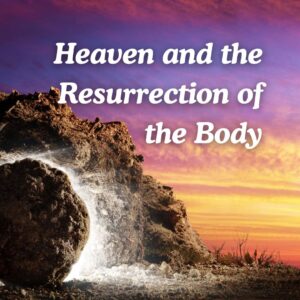 The concept of heaven and the resurrection of the body is central to Christian eschatology. It offers hope and comfort to believers, promising not only eternal life but also the renewal of the whole person, body and soul. This belief, rooted in Scripture and affirmed throughout Christian tradition, is a profound expression of God’s redemptive plan for humanity. In this article, we will explore the biblical basis for the resurrection of the body, its theological significance, and what it means for our understanding of heaven.
The concept of heaven and the resurrection of the body is central to Christian eschatology. It offers hope and comfort to believers, promising not only eternal life but also the renewal of the whole person, body and soul. This belief, rooted in Scripture and affirmed throughout Christian tradition, is a profound expression of God’s redemptive plan for humanity. In this article, we will explore the biblical basis for the resurrection of the body, its theological significance, and what it means for our understanding of heaven.
The Resurrection of the Body in Scripture
The resurrection of the body is a foundational doctrine of the Christian faith, articulated in both the Old and New Testaments. The concept is first hinted at in the Hebrew Scriptures, particularly in the Book of Daniel, where the prophet speaks of a future resurrection: “Many of those who sleep in the dust of the earth shall awake, some to everlasting life, and some to shame and everlasting contempt” (Daniel 12:2, WEBBE). This passage points to a bodily resurrection, where the dead are raised to face their final judgment.
In the New Testament, the resurrection of the body is fully revealed in the teachings and resurrection of Jesus Christ. Jesus Himself speaks of the resurrection when He says, “For the hour comes in which all who are in the tombs will hear his voice, and will come out, those who have done good, to the resurrection of life; and those who have done evil, to the resurrection of judgment” (John 5:28-29, WEBBE). This promise of resurrection is not limited to the righteous alone but extends to all people, with the final destiny determined by their relationship with God.
The Apostle Paul offers the most detailed explanation of the resurrection of the body in his first letter to the Corinthians. He writes, “But if there is no resurrection of the dead, neither has Christ been raised. If Christ has not been raised, your faith is vain; you are still in your sins” (1 Corinthians 15:13-14, WEBBE). Paul’s argument is clear: the resurrection of Jesus is the guarantee of our own resurrection. Just as Christ was raised from the dead in a glorified body, so too will believers be raised in a glorified state.
Paul continues by describing the nature of the resurrected body: “So also is the resurrection of the dead. The body is sown in corruption; it is raised in incorruption. It is sown in dishonour; it is raised in glory. It is sown in weakness; it is raised in power. It is sown a natural body; it is raised a spiritual body” (1 Corinthians 15:42-44, WEBBE). The resurrection body is thus transformed from its earthly, corruptible state into a glorified, spiritual body fit for eternal life in heaven.
The Theological Significance of the Resurrection of the Body
The resurrection of the body is not merely a theological concept but a profound expression of God’s love and justice. It affirms the goodness of creation, including the physical body, and God’s intention to redeem and restore all of creation. The resurrection of the body demonstrates that salvation is not just about the soul but involves the whole person—body and soul united in eternal life.
This belief also underscores the continuity between our present lives and our future existence in heaven. The resurrection body, while transformed and glorified, is still recognizably our own body. This continuity is a sign of God’s faithfulness to His creation and His desire to bring it to perfection. The resurrection is not a rejection of the physical world but its fulfillment, where all things are made new.
Moreover, the resurrection of the body is intimately connected to the hope of heaven. Heaven is not merely a spiritual state but a place where resurrected bodies dwell in the presence of God. In this sense, the resurrection of the body is a prerequisite for entering heaven, as it prepares us to fully experience the joys of eternal life. The glorified body is capable of participating in the divine life, reflecting God’s glory and sharing in the Beatific Vision—the direct, unmediated vision of God, which is the ultimate joy of heaven.
The Resurrection of the Body and the Final Judgment
The resurrection of the body is also closely linked to the final judgment, where each person will be judged according to their deeds. As Jesus teaches, “But when the Son of Man comes in his glory, and all the holy angels with him, then he will sit on the throne of his glory. Before him all the nations will be gathered, and he will separate them one from another, as a shepherd separates the sheep from the goats” (Matthew 25:31-32, WEBBE). The final judgment is the moment when the resurrected body and soul are reunited, and each person’s eternal destiny is revealed.
For the righteous, the final judgment is a moment of vindication and reward. Their resurrection bodies will be glorified, free from all suffering and death, and they will enter into the eternal joy of heaven. As Jesus promises, “Then the righteous will shine like the sun in the kingdom of their Father” (Matthew 13:43, WEBBE). This image of the righteous shining like the sun reflects the glory and radiance of the resurrection body, which shares in the light of Christ.
For the unrighteous, however, the final judgment is a moment of separation from God. Their resurrection bodies, though raised, will not share in the glory of heaven but will be consigned to “shame and everlasting contempt” (Daniel 12:2, WEBBE). This sobering reality highlights the seriousness of our choices in this life and the importance of living in accordance with God’s will.
The Resurrection of the Body and Christian Hope
The belief in the resurrection of the body is a source of immense hope for Christians. It reassures us that death is not the end but the beginning of a new and eternal life. This hope is not a vague or abstract concept but a concrete reality grounded in the resurrection of Jesus Christ. As Paul writes, “But now Christ has been raised from the dead. He became the first fruits of those who are asleep” (1 Corinthians 15:20, WEBBE). Christ’s resurrection is the first fruits—the guarantee and foretaste—of our own resurrection.
This hope also gives meaning to our present lives. Knowing that our bodies will be raised and glorified motivates us to live in a way that honors God and reflects our dignity as His children. It encourages us to care for our bodies and to use them for good, knowing that they are destined for eternal life. The resurrection of the body also inspires us to live with a sense of purpose, recognizing that our actions in this life have eternal consequences.
Moreover, the hope of the resurrection provides comfort in times of suffering and loss. When faced with the death of a loved one, the promise of the resurrection offers solace and assurance that we will be reunited with them in heaven. This hope allows us to grieve with faith, knowing that death has been defeated and that life in Christ is victorious. As Paul writes, “But when this corruptible has put on incorruption, and this mortal has put on immortality, then what is written will happen: ‘Death is swallowed up in victory'” (1 Corinthians 15:54, WEBBE).
Living in Light of the Resurrection
The belief in the resurrection of the body calls Christians to live with a heavenly perspective. It reminds us that our ultimate destiny is not in this world but in the new creation, where we will dwell with God forever. This perspective should shape our priorities, our relationships, and our values, leading us to seek the things that are above, where Christ is seated at the right hand of God (Colossians 3:1, WEBBE).
Living in light of the resurrection also means embracing the virtues that prepare us for eternal life—faith, hope, and love. These virtues, as Paul reminds us, are the greatest gifts of the Spirit and are essential for our journey to heaven (1 Corinthians 13:13, WEBBE). Faith keeps us grounded in the promises of God, hope sustains us through trials and challenges, and love unites us with God and one another in the bond of charity.
Finally, the resurrection of the body calls us to a life of holiness. As Paul exhorts the Thessalonians, “May the God of peace himself sanctify you completely. May your whole spirit, soul, and body be preserved blameless at the coming of our Lord Jesus Christ” (1 Thessalonians 5:23, WEBBE). Holiness is the pathway to heaven, where we will be fully sanctified and made perfect in God’s presence.
Conclusion: The Eternal Promise of Resurrection
The resurrection of the body is a profound and central doctrine of the Christian faith. It is the promise of God’s ultimate victory over death and the fulfillment of His plan for creation. This belief offers hope, comfort, and purpose to our lives, reminding us that our true home is in heaven, where we will dwell with God in glory. As we live in anticipation of this promise, may we strive to live in a way that honors God and prepares us for the eternal joys of the resurrection.
You may also want to read the book “What Should You Look Forward To In Heaven?”
FREE Download - "Short Poems on Grief and Loss"

